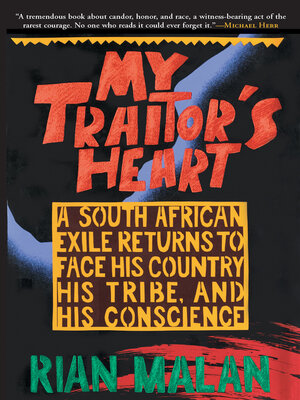My Traitor's Heart
ebook ∣ A South African Exile Returns to Face His Country, His Tribe, and His Conscience
By Rian Malan

Sign up to save your library
With an OverDrive account, you can save your favorite libraries for at-a-glance information about availability. Find out more about OverDrive accounts.
Find this title in Libby, the library reading app by OverDrive.



Search for a digital library with this title
Title found at these libraries:
| Loading... |
An essay collection that offers “a fascinating glimpse of post-apartheid South Africa” from the bestselling author of My Traitor’s Heart (The Sunday Times).
The Lion Sleeps Tonight is Rian Malan’s remarkable chronicle of South Africa’s halting steps and missteps, taken as blacks and whites try to build a new country. In the title story, Malan investigates the provenance of the world-famous song, recorded by Pete Seeger and REM among many others, which Malan traces back to a Zulu singer named Solomon Linda. He follows the trial of Winnie Mandela; he writes about the last Afrikaner, an old Boer woman who settled on the slopes of Mount Meru; he plunges into President Mbeki’s AIDS policies of the 1990s; and finally he tells the story of the Alcock brothers (sons of Neil and Creina whose heartbreaking story was told in My Traitor’s Heart), two white South Africans raised among the Zulu and fluent in their language and customs.
The twenty-one essays collected here, combined with Malan’s sardonic interstitial commentary, offer a brilliantly observed portrait of contemporary South Africa; “a grimly realistic picture of a nation clinging desperately to hope” (The Guardian).
The Lion Sleeps Tonight is Rian Malan’s remarkable chronicle of South Africa’s halting steps and missteps, taken as blacks and whites try to build a new country. In the title story, Malan investigates the provenance of the world-famous song, recorded by Pete Seeger and REM among many others, which Malan traces back to a Zulu singer named Solomon Linda. He follows the trial of Winnie Mandela; he writes about the last Afrikaner, an old Boer woman who settled on the slopes of Mount Meru; he plunges into President Mbeki’s AIDS policies of the 1990s; and finally he tells the story of the Alcock brothers (sons of Neil and Creina whose heartbreaking story was told in My Traitor’s Heart), two white South Africans raised among the Zulu and fluent in their language and customs.
The twenty-one essays collected here, combined with Malan’s sardonic interstitial commentary, offer a brilliantly observed portrait of contemporary South Africa; “a grimly realistic picture of a nation clinging desperately to hope” (The Guardian).






